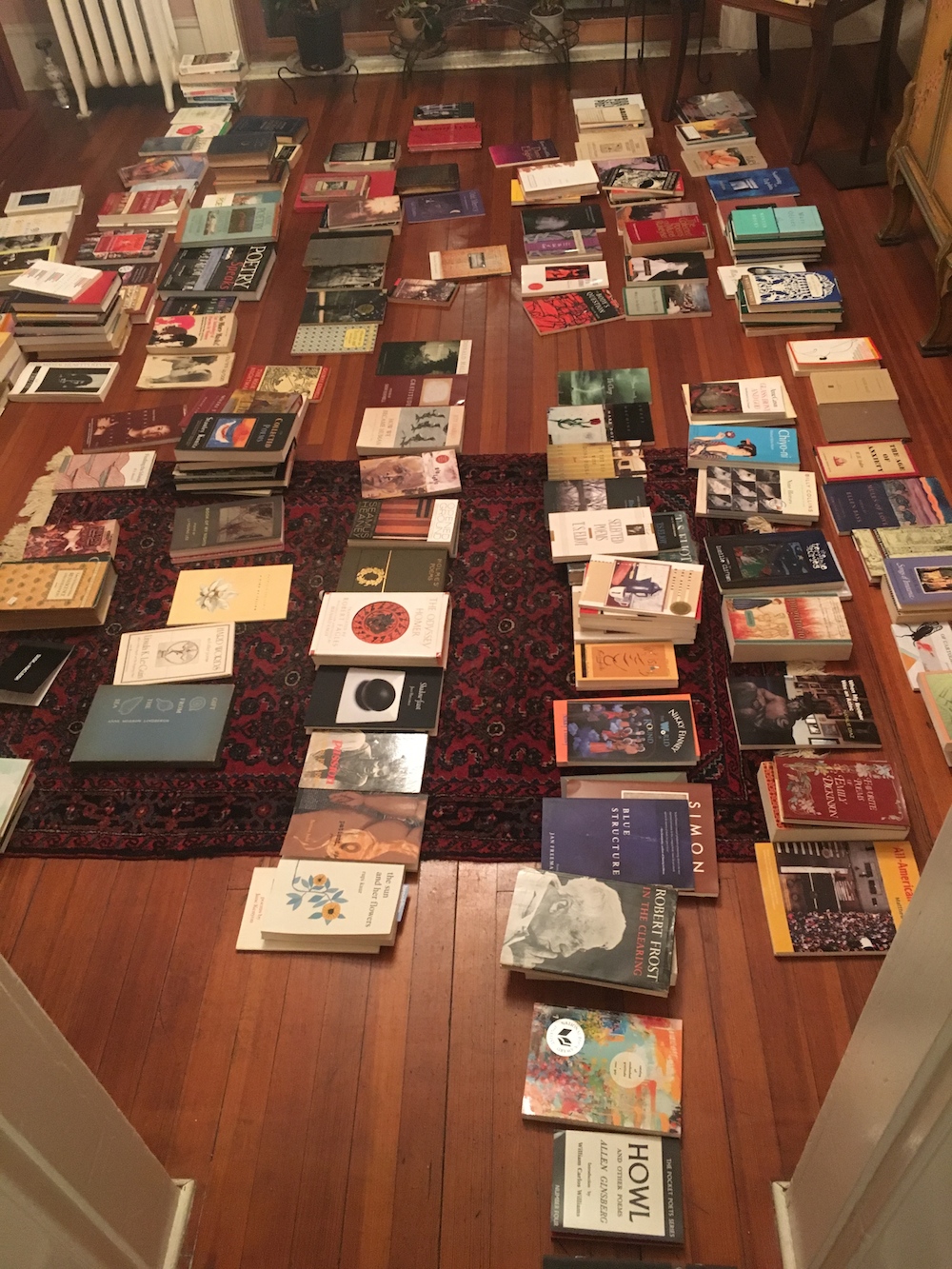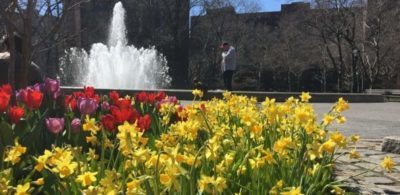
Writing Retreat Day 1: Exiled from the City of Poems
“But poetry — which awakens our senses, frees us from the tyranny of literal meaning and assures us of the credible reality of emotional truth — puts us in touch with something bigger than language, something I believe each of us was perhaps fluent in before the moment when language became our chief vehicle for meaning.”
Tracy K. Smith, U.S. Poet Laureate
Remarks at the Library of Congress
From Akhmatova to Yeats
At the close of my first day of a weeklong writers retreat, I found myself at a loss. At issue were my poems, which despite months of revision, re-grouping, workshopping and worrying over, could not be coaxed to coalesce into a book.
Rather than hang together like matching pearls on a necklace, mine had accreted over the years with too much time between them, so now they were merely a collection of beads from different periods of my life, clattering away in a drawer. (Now you see? I can’t even craft the correct metaphor for what is wrong with my poems—let alone make them right.)
So, after mucking around on the page till dinnertime I called it a day, and rather than go on auto-pilot and lose myself in the Netflix series that I’m currently addicted to, I decided instead to alphabetize my poetry bookshelves, which have been in a state of disarray since I moved nearly a year ago. At least that way I could accomplish something, if not by writing my own poems, then by organizing what others have written.
It was a counter-instinctual move, as I was feeling betrayed by poetry, and also as if I were betraying it by wanting to abandon my own poems. Was I merely wallowing in my grief over the poems I needed to let go–at least for now? And if so, wouldn’t arranging the works of others just drag me down deeper? Faced with my own poetic despair would I just want to toss all those books away, and fill those shelves with something more practical instead?
I didn’t stop to think. I pulled the books from the shelves and lined them up in rows across the bare floor, the area rug, and out into the hall. I arranged them alphabetically from Akhmatova to Yeats. I made piles of anthologies (classic, contemporary, collections of sonnets, of poems by women, poems from the Middle East, poems by children …) and piles of books on the craft of writing poetry, on reading poetry, and more piles for published journals and letters of poets, and then biographies.
 A curated collection
A curated collection
Having moved many times, and Marie-Kondo-ized my home once, every book that remains in my collection has its own story halo-ing around it. I have my grandfather’s classic American poetry bound with its gold-embossed, faux-velvet cover, and my mother’s copy of “Sonnets from the Portuguese” in its cardboard sleeve, and inscribed to her by her high school BFF. I have books signed to me by authors I met at readings I attended and readings I organized for my students.
As the books piled and spread across the floor, they blossomed into a city, with towers of Frost, Dickinson, Kunitz, and Kumin rising from the floorboards. New villages of contemporary favorites like Nikky Finney, Laurie Ann Guerrero, and Terrance Hayes began to command the horizons, too.
Some alphabetical neighborhoods became particularly valuable real estate: like the powerhouse of P through R, where Plath, Piercy, Rich, and Rukeyser reside spine to spine.

I dusted off the artwork along with the empty shelves: An oil sketch of Whitman by my Jr. High School boyfriend, now a successful artist, presides over one tall bookcase. A framed photo of Naomi Shihab Nye reading to my students, with a facing picture of me listening as she read, my smile bursting with delight, graces the other.

Re-shelving and re-discovery
Placing handfuls of books back on the shelves, I relived moments of joy, connection, and discovery:
- The summer afternoon, when as a high school student I first read Leaves of Grass aloud with a new friend while rain stormed just beyond the screened porch were we sat
- Bringing my mother with me to readings of my new literary heroes during my grad school years, when I made myself a temporary home in the guest room in her New York City apartment
- The conversations I’d had with poets as they signed their books after readings
- The books by my friends (most still living, some now gone)
- The volume of poems I read on the lawn with my now long-gone dog curled at my feet
- The poems that inspired poems of my own, and the ones I taught to my students.
There was wisdom to mine from these literary ancestors gathered here on these shelves, too. I have learned countless lessons from the ways they loved life and railed against death—or in some cases, courted it; their messy emotions, the abyss of uncertainty, the insistent wellspring of hope that roils up from the white spaces that surround each printed line.
And too, there was the parade of personas that rose up in room, each a mirrored version of my self: The me who loved each book, or pretended I did or thought I should—the me who grew into or grew out of them, who memorized the poems as I walked through the meadows, or inked lines by Holmes or Keats into small notebooks, then balanced the pages against the steering wheel so I could recite as I drove to and from work on my daily commute.
Standing amidst the books stacked at my feet I felt like a visitor in a city of poems that I helped create. This metropolis of words that I get lost in, want to run away from and long to be welcomed back to. I want to build something of my own here. Find my place in these towering volumes, a room that’s mine, a garden to weed or plant.
I leave and return. I leave and I stay away.
In my dreams I wander through these familiar and unfamiliar blocks, I find a stoop where I can stop and rest. Beauty and anxiety exchange greetings on the corner. Earnest conversations begin at café tables, and the citizens all have heart.
I overhear lines that arise from the collected crowd. I bring some home with me.
I in my bed, sleeping. The books standing sentry in their places.
In another room, my own pages are quiet, listening.

Copyright Tzivia Gover, 2018
Ah, summertime and the writing is … not always so easy. Read on for more posts about a dreamy summer from the desk of yours truly:
What I Did on My Summer Vacation
This was my 9-5 during my weeklong summer vacation at Writing Camp: By day I wrote, shared work aloud with 11 other writers, and talked shop (mostly) during lunches around a large wooden table, our plates heaped with fresh salads, hearty breads, and nourishing entrees. But in a sense, for me the real work took place at night. KEEP READING
Gardening Season and Its Discontents
Each summer I imagine that I will spend my days writing and gardening. That’s an idyllic combination – theoretically at least. Sadly, gardening is not my forte. Despite my annual attempts, I have not managed to create the symphony of color and bloom that I dream of. Weeds, you see, feel quite welcome in my garden. They are seldom disturbed and grow happily. KEEP READING

Sparklingly inspiring, dear friend and colleague! Thanks for this. And Blessings on the journey.
<3
Makes me want to take a journey through my own shelves, with an eye towards discovery, rather than doing a chore.